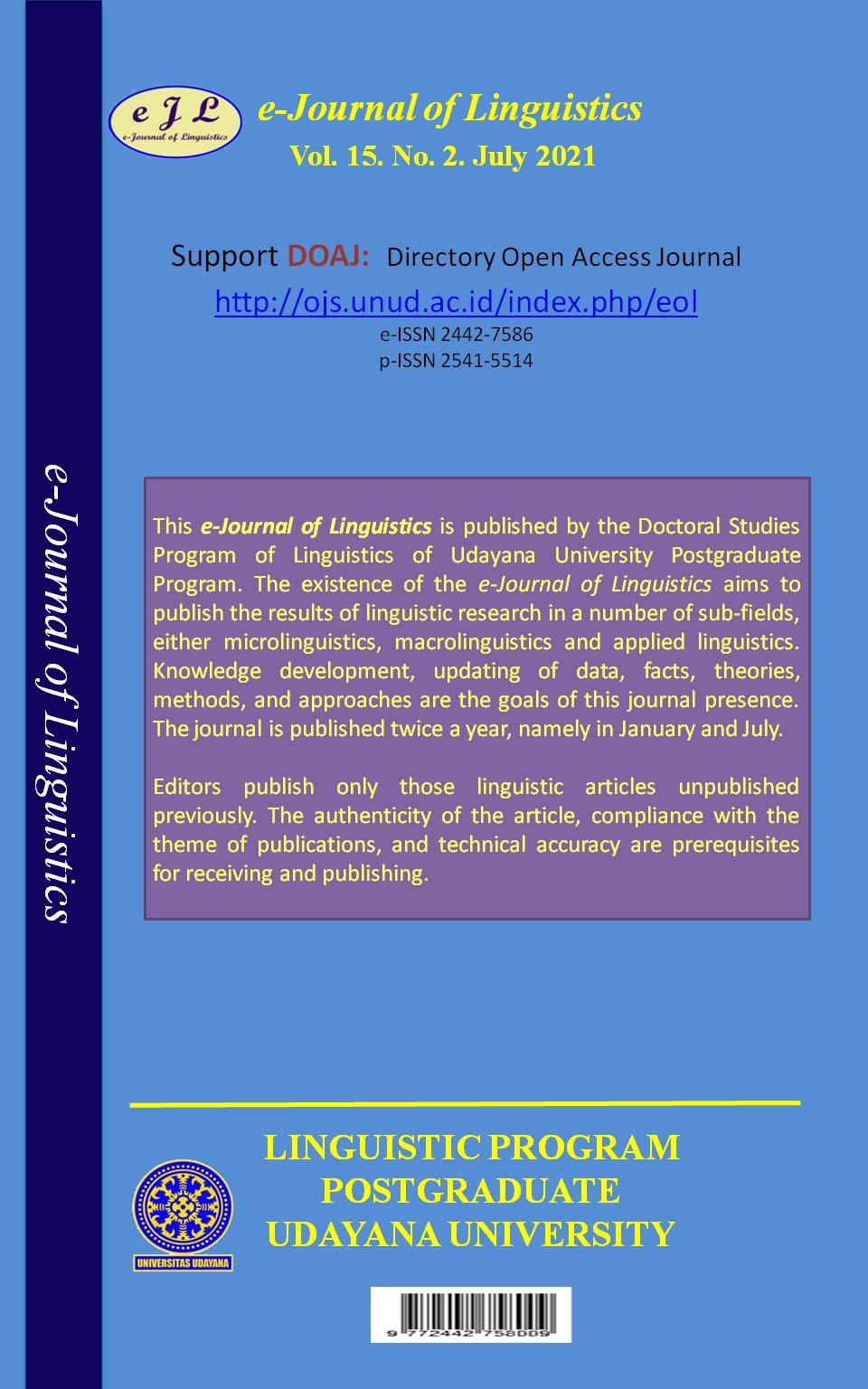Hegemonic Ideology in Buruan Novel: A Post-colonial Study
Abstract
This study aims at finding the ideology of hegemony in the novel Buruan based on post-colonialism studies. There are three elements of post-colonialism, namely hegemony, mimicry and hybridity. In this study, it focuses on the hegemony element because it reflects the hegemonic party and the hegemonic party. The method used in this research is the interview method and the literature method through the recording technique and note-taking technique. The results of the analysis were carried out by analytic descriptive with interpretation method and hermeneutic approach. The results showed that the perpetrators of hegemony in the novel Buruan were Japanese soldiers as invaders of the Indonesian people and skipper of the Misbah boat. Both of these actors treat women as oppressed parties from sexual behaviour and violence. This resulted in a hegemonic ideology that women as a subordinate group and victims of oppression from the attitude of male domination as a powerful group.
Downloads
References
Atmaja, Nengah Bawa. 2010. Ajeg Bali, Gerakan, Identitas Kultural, dan Globalisasi. Yogyakarta : PT. LKIS Printing Cemerlang.
Day, Tony dan Keith Foulcher (ed). (2006). Clearing a Space: Kritik Pascakolonial
tentang Sastra Indonesia Modern. Jakarta: Yayasan Obor Indonesia.
Fatonah, Khusnul. 2018. Ideologi Narator dalam Novel Malaikat Lereng Tidar Karangan Remy Sylado (Kajian Poskolonialisme). Jurnal Eduscience, 3 (2), 86-101.
Fitri Nidya, Artawa Ketutu, Satyawati Sri Made, and Sawirman. 2019. The Language Ideology through Declarative Sentence Strategy: The Opening Statement Text Structure In Indonesia’s Courtroom Text. International Journal of Lingustics, Literature and Translation (IJLLT), 2 (1), 256-260. https://doi.org/10.32996/ijllt.2019.2.1.31.
Grayson Paul J. 1983. Male Hegemony and The English Canadian Novel. Canadian Review of Sociology, 20 (1), 1-21. https://doi.org/10.1111/j.1975-618X.1983.tb00886.x.
Hidayat, R. 2004. Ilmu yang Seksis Feminisme dan Perlawanan Terhadap Teori Sosial Maskulin. Yogyakarta: Jendela.
Kutha Ratna, I Nyoman. 2004. Teori, Metode, dan Teknik Penelitian Sastra dari Strukturalisme Hingga Postrukturalisme : Perspektif Wacana Naratif. Yogyakarta : Pustaka Pelajar.
Latupeirissa, D. S., Laksana, I. K. D., Artawa, K., & Sosiowati, I. G. A. G. (2019). On Political Language Ideology: Critical View of Indonesian President Speech. Journal of Language Teaching and Research, 10(4), 843-850.
Loomba, Ania. (2003). Kolonialisme/Pascakolonialisme. diterjemahkan oleh Hartono Hadikusuma. Yogyakarta: Bentang Budaya.
Moleong, Lexy J. 1996. Metodelogi Penelitian Kualitatif. Bandung : PT. Remaja Rosdakarya.
Mekarini Wayan, Sutjaja Made Gusti, Pastika Wayan, Sutama Putu. 2014. Ideologies Beyond The Inviting Rain Text By Balinese Migrant In Sumbawa. E Journal of Linsguitics, 8 (1), 1-11. Denpasar: Universitas Udayana.
Poesponegoro, Marwati Djoned. 1984. Sejarah Nasional Indonesia VI. Jakarta: Balai Pustaka.
Strinati, D. 2003. Popular Culture Pengantar Menuju Teori Budaya Populer. Yogyakarta: Bentang Budaya.
Supadmi, N., Sudipa, N., Budiarsa, M., & Laksana, I. K. D. (2020). The Ideology of Narrative Text “I Lacur”. The International Journal of Social Sciences World (TIJOSSW), 2(2), 161-168.

This work is licensed under a Creative Commons Attribution 4.0 International License











